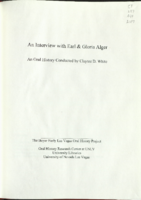Search the Special Collections and Archives Portal
Search Results

Howard Heckethorn interview, March 2, 1977: transcript
Date
Archival Collection
Description
On March 2, 1977, Neil C. Dalmas interviewed teacher Howard Heckethorn, (born on September 14th, 1922 in St. George, Utah) at Red Rock Elementary School in Las Vegas, Nevada. This interview offers an overview of early education in Nevada. Mr. Heckethorn also discusses Stewart Ranch, Howard Hughes and the Hughes Site, and the migration of the Mormons to the Las Vegas area.
Text

Mara Braun interview, September 9, 2019: transcript
Date
Archival Collection
Description
Interviewed by Barbara Tabach. Mara Braun, a native of Puerto Rico, has lived in Las Vegas since 1975. She is the owner/operator of a successful event and catering business. Mara married Abe Braun and raised their children in both Latinx and Jewish traditions.
Text
Judith Boyer oral history interview
Identifier
Abstract
Oral history interview with Judith Boyer conducted by Claytee D. White on November 8, 2005 for the Boyer Early Las Vegas Oral History Project. Judith Boyer discusses moving to Las Vegas, Nevada in 1948 and her careers working at Ronzoni's Department Store and as a stewardess for Bonanza Airlines. She also discusses Las Vegas as it was in the 1950s.
Archival Collection

Transcript of interview with Earl and Gloria Alger by Claytee D. White, October 29, 2009
Date
Archival Collection
Description
Text
Sarah Serna oral history interview
Identifier
Abstract
Oral history interview with Sarah Serna conducted by Dennis McBride on December 04, 1998 for the Las Vegas Gay, Lesbian, Bisexual and Transgender Archives Oral History Project. Serna opens her interview by discussing her move to Las Vegas, Nevada in 1993, and her first assignment as a Methodist minister to a small congregation in North Las Vegas. Serna then explains how she became involved in LGBT social justice issues after witnessing expressions of homophobia and prejudice within her church. She discusses her involvement with the Las Vegas LGBT community and the development of a pastoral care outreach program, the development of the World AIDS Day prayer vigil, and the foundation of the Community Counseling Center, later renamed Lighthouse Ministry. Serna then talks about her decision to transition from the Methodist Church to the Episcopalian Church and becoming the first Episcopalian priest in Las Vegas to bless same-sex marriages. She also discusses the development of a transitional housing program, changes in the LGBT community in Las Vegas, and many individuals involved in LGBT social justice programs in Las Vegas.
Archival Collection

Nicole Charlton oral history interview: transcript
Date
Archival Collection
Description
Oral history interview with Nicole Charlton conducted by Barbara Tabach on May 23, 2018 for the Remembering 1 October Oral History Project. In this interview, Charlton discusses her early life in Carlin, Nevada and relocating to Las Vegas, Nevada in 1990. Charlton is the Executive Secretary to the Clark County Coroner John Fudenberg and was among the first from the Coroner's office on the scene of the Route 91 shooting in Las Vegas.
Text

LeMoyne Legere interview, March 17, 1977: transcript
Date
Archival Collection
Description
On March 17, 1977, collector Cecilia Branch interviewed LeMoyne Legere (born in 1935) at her residence in Las Vegas, Nevada. In this interview, Mrs. Legere discusses various differences in Las Vegas from the time she was growing up to the date of the interview. She also discusses her involvement in high school and what people do for recreation.
Text

Transcript of interviews with J. David Hoggard, Sr. by Claytee D. White and an unnamed interviewer in 1997, 1998, and 1999
Date
Archival Collection
Description
Transcript of interviews with J. David Hoggard, Sr. by Claytee D. White, and unnamed interviewers in 1997, 1998 and 1999. Hoggard moved to Las Vegas in 1945 and became involved in civil rights through the National Association for the Advancement of Colored People and the Economic Opportunity Board.
Text

Felipé Goodan interview, April 1, 2019: transcript
Date
Archival Collection
Description
Interviewed by Monserrath Hernández. Rabbi at Temple Beth Sholom since 1998, Felipe Goodman is a native of Mexico City. He identifies as a Mexican Jewish American, and shares the complexities of these.
Text
John Fudenberg oral history interview
Identifier
Abstract
Oral history interviews with John Fudenberg conducted by Barbara Tabach and Claytee D. White on May 3, 2018 and May 23, 2018 for the Remembering 1 October Oral History Project. In this interview, John Fudenberg, the coroner for Clark County in Las Vegas, Nevada, gives an account of his experience during the October 1, 2017 mass shooting on the Las Vegas Strip and what his role was during the tumultuous days after the shooting. He explains how he and the staff of the coroner's office prepared for the large number of casualties as well as their arrival at the Route 91 Harvest festival venue. Fudenberg speaks of setting up the Family Assistance Center at the convention center and how it supported the community but also aided the coroner's office in gathering information about the deceased and identifying them. Fudenberg discusses the main job of the Coroner's Office during the first week after the shooting, which was to autopsy the bodies and communicate with the families, as well as the Police Department. He also talks about the emotional impact the shooting and its aftermath had on him and his staff members and the wellness program they implemented, of which trauma yoga and meditation had a large impact.
Archival Collection
